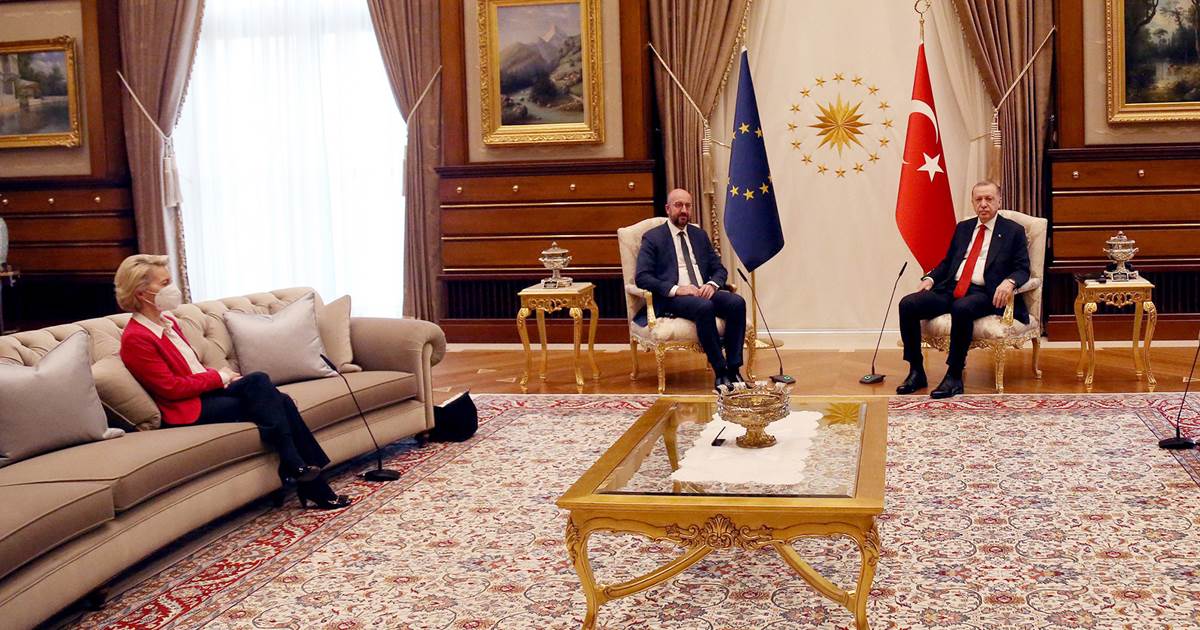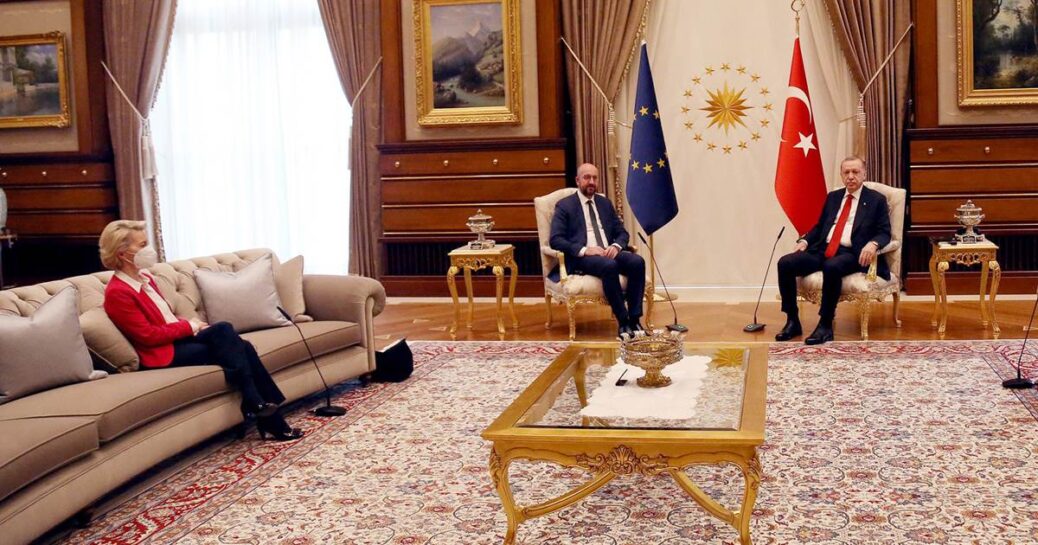
LONDON — An incident in which one of the world’s most powerful women said she was the victim of sexism has shed light on the ongoing hurdles women face at work, both in Europe and around the world.
When European Commission President Ursula von der Leyen and European Council President Charles Michel met with Turkish President Recep Tayyip Erdogan in Ankara for talks April 6, only two chairs had been set out for the three leaders.
Michel took the chair next to Erdogan, while von der Leyen looked at the seated men, uttered an “ehm” sound and then sat in the middle of a large sofa, away from her male counterparts.
At the time, it made waves on social media and became known in Europe as “sofagate.” But it wasn’t until earlier this week that von der Leyen spoke out extensively about what happened.
“I am the president of the European Commission, and this is how I expected to be treated when visiting Turkey two weeks ago — like a commission president. But I was not,” she told European Union lawmakers Monday. “I cannot find any justification for what I was treated in the European treaties. So, I have to conclude that it happened because I am a woman.”
It was a sharp rebuke to a country with whom relations are already tense. Two days after the incident, Turkish Foreign Minister Mevlut Cavusoglu called criticism over the incident “unfair” and said that “the seating arrangements were made in line with the E.U. suggestion.”
A European Commission spokesperson said at the time that von der Leyen should have been seated in the same manner as Michel.
The Turkish Foreign Ministry said in a statement the incident was a result of the “incoordination and negligence” of E.U. protocol. It also said it was pleased that the presidency is held by a woman for the first time.
For Jutta Allmendinger, president of the WZB Berlin Social Science Centre and a professor of sociology at Humboldt University in Berlin, the incident didn’t come as a surprise — though von der Leyen’s willingness to speak out did.
“I think it took her some courage to make these explicit comments and to say it in parliament,” she said.
The incident also highlighted men’s role in perpetuating and addressing sexism, Allmendinger said.
Download the NBC News app for breaking news and politics
“Michel was next to von der Leyen and realized the situation, and it would have been up to him to speak up. I don’t think she had an option there. Michel could have changed the situation, though. Equality also means that men do not only see discrimination, but also act against it.”
On Monday, Michel apologized in parliament for the incident and reaffirmed his commitment to gender equality.
Von der Leyen hails from Germany, known as the engine of Europe and which has been led by a female leader since 2005. Nevertheless, the country lags behind others in the Organization for Economic Cooperation and Development and the E.U. when it comes to the share of women managers in the workforce. It also comes out in the middle of 37 OECD countries for the share of women in the workforce, at 46.7 percent, compared to Lithuania at the high end of the scale with 50.1 percent.
Janina Kugel, a former chief human resources officer at the Germany-based global engineering firm Siemens, said it was her experience working abroad that helped her see that both a high-powered career and a family were possible.
“I had a lot of role models in Scandinavia and the U.S., where I saw men and women that managed both family and career,” said Kugel, who also served on the board of Siemens and wrote the recently published book, “It’s Now: Live, Lead, Work.”
“If I hadn’t had global experience, if I would have taken the stereotypical German role model picture, then maybe it would have been a harsher discussion.”
Germany still has a long way to go toward equality, and only government policies both there and worldwide will help bridge the gaps, according to Allmendinger.
“Our social security system, our tax system, our part-time schooling and our part-time child care facilities all foster a traditional role model for women and men,” she said.
Von der Leyen’s comments were also notable given the reluctance of German Chancellor Angela Merkel, who has been in power for nearly 16 years, to explicitly call herself a feminist. When asked in 2017 if she considered herself one, she shook her head, hesitated and said that she didn’t want to “adorn herself with that feather.”
The comments come at a time when Covid-19 has magnified the gender gap and caused women’s participation in the workforce to drop. Women make up 39 percent of global employment but account for 54 percent of overall job losses, according to the consulting firm McKinsey.
“In the context of Covid-19, the share of women in leadership roles has fallen back by one to three years,” Vesselina Stefanova Ratcheva, Insights Lead at the World Economic Forum’s Centre for the New Economy and Society, said in an email.
In the U.S., the challenges created by the pandemic have meant that as many as 2 million women were considering leaving the workforce, according to McKinsey’s Women in the Workplace 2020 study. The more women leave work, the fewer there are to be promoted to senior roles in the future.
These ongoing hurdles, amplified by the pandemic, are why von der Leyen’s willingness to speak out, and the shocked reaction to the incident, have also cheered activists.
“Sometimes women leaders think, ‘I just have to accept this and battle through it and not draw attention to it,’ but the problem with that is that the next person to step up into a similar position has to take on the same battle all over again,” said Rosie Campbell, director of the Global Institute for Women’s Leadership at King’s College London.
“I’d like to think it’s a tipping point, and just as the way this news story made waves around the world, we aren’t going to stand for that anymore. Of course, that progress requires us to stand up and demand it.”










Recent Comments